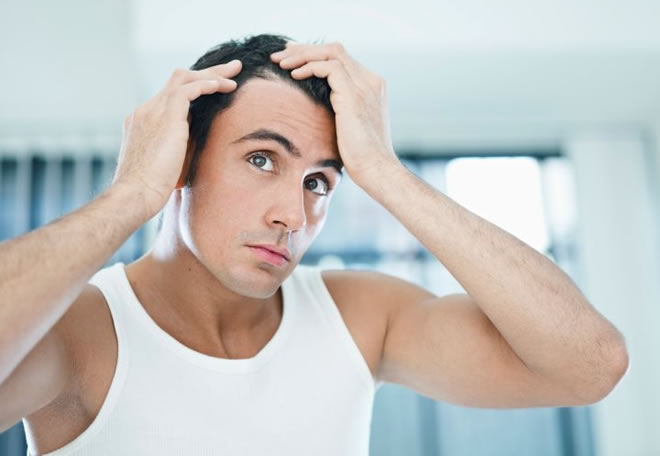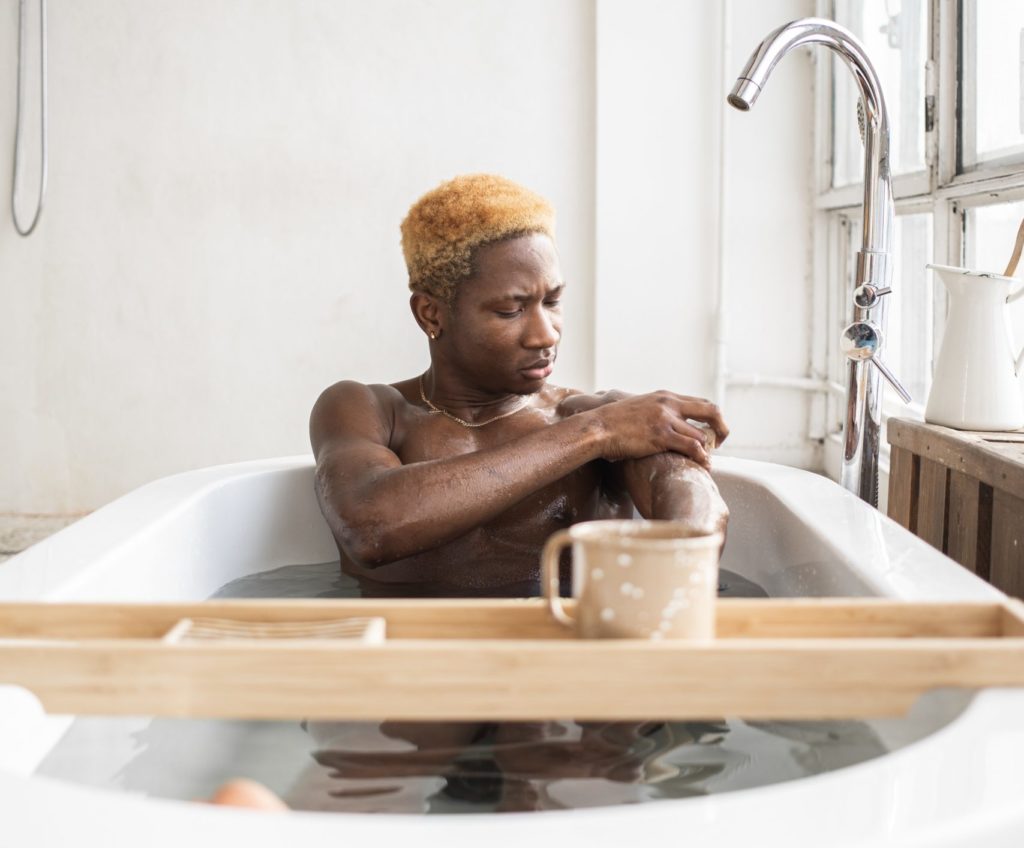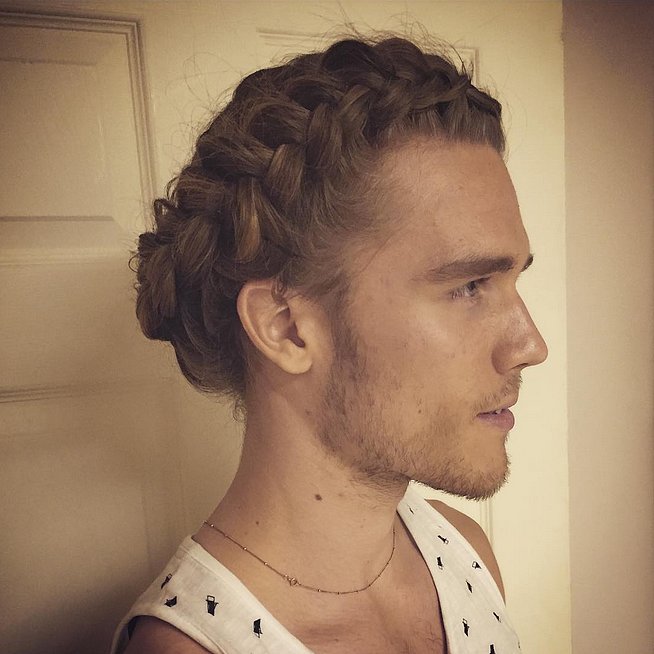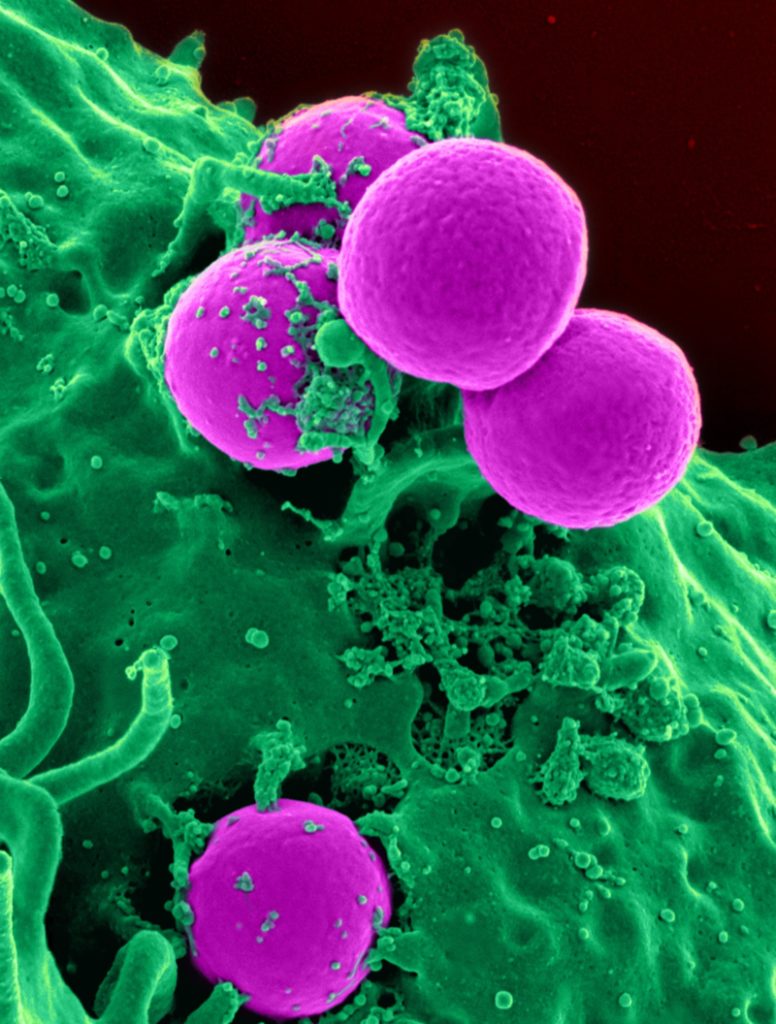Hey guys, run your hand through your hair and then count the strands that you see. You know, as a man ages, he can be sure of three things: death, taxes, and less hair (not all men go bald, but it is rare to keep ALL your hair). And while taxes should hopefully be the first of these to come, statistics suggest that two out of three men who have reached the age of 35 will have already begun the dreaded ‘hair shedding‘ process.
Traditionally, the manly thing to do once the bald spots get beyond a certain diameter is to invest in a good razor, own your new look, and carry it off with confidence. But options have grown since those old days, so if you’re not one of the people who look great with a chromed dome, listen up. The first step is to get a grip, do your research (visit a doctor), and resist putting all the blame on your mom, dad, and your Grandpa Joe.
Genetics play the largest role in how susceptible you are to androgenetic alopecia (also known as male pattern baldness), which is the most common form of hair loss. But—know that these genes can come from both your paternal and maternal side.”
– Dr. Peter Young
And besides, you may play a bigger role in this situation than you think.
Environmental and physical stressors play a huge part in men losing hair.”
-Dr. Glynis Ablon
Let’s make it clear from the start that not all hair loss in men is genetic. There are a lot of factors that go into maintaining a healthy full head of hair, including your daily shampoo, diet, and stress. And even if your case does turn out to be androgenic alopecia (male pattern baldness), the choice is going to be up to you to either take hold of the reins or allow your pre-programmed balding to continue on its merry way, undisturbed.
There is no simple cure for hair loss, so if you do nothing, the result will always be nothing (less hair). But there are options available that can stop the shedding, and occasionally re-grow some of that lost hair. Unfortunately, the longer you allow your hair follicles to wither without taking steps, the less likely they can be saved. So what we are saying here is that time is not on your side, so whatever you’re going to do, you better do it now, and that means today!
And for your best options, we turn to our experts, Dr. Glynis Ablon of Dove Men+Care and Dr. Peter Young, the Medical Director for Keeps.com. Okay, doctors, you’ve got our attention:
What is it about the Fall and Winter season that seems to wreak extra havoc on a man’s hair?
Dr. Glynis Ablon: It is important to understand that cold weather actually affects the cuticle, which is along the hair shaft. It opens up the cuticle and leads to dry frizzy hair. So, the idea is that in cold weather, especially, you want to make sure that you have some kind of sealant on that hair shaft so that it doesn’t get opened up and damaged.
Urbasm: Like a conditioner?
Dr. Ablon: Yeah, Dove has a shampoo that has a conditioner, but the idea is that the conditioner contains polymers as well as silicone. It is these little silicone particles, that are almost like nano-particles; they coat the hair – not heavy – and protect it. It seals in the cuticle so that you don’t have damage from cold weather.
Urbasm: Do most shampoos have these silicone polymers?
Dr. Ablon: The silicone is specific to the ‘Thickening and Resilient’ product from Dove Men+Care. Dove did a study where they found that people who use this shampoo had three times less hair damage, shedding, and breakage when used. But it is important that you do see a dermatologist, because depending on what is going on, you may need a different kind of shampoo. People that have flaky scalps may have a condition called Dermatitis Seborrheic, which is also known as dandruff. Those patients may need some zinc in their shampoo.
Urbasm: What about the dry heat from home furnaces?
Dr. Ablon: The trauma we do with blow drying and hot tools damages the shaft of the hair. Once again, you need to create something you can protect the hair with, and using pomades and things like that will also create protection for the hair shaft.
Urbasm: Wait, so you are saying that ‘styling products’ actually provide protection?
Dr. Ablon: Yup, they do. But if you do too much, all you end up with is a lot of build-ups – and that is when you notice your hair seems greasy. The nice thing about Dove, is they actually have a gel and a pomade. The styling gel is nicer for oilier hair and the pomade is best for people with dry hair.
50 percent of men still use soap to wash their hair.”
– Dr. Glynis Ablon
What damaging things do men inflict on their hair without even knowing it?
Dr. Ablon: Dove did this great survey. They surveyed 200 US dermatologists’, and I was one of them. We all agreed—90 percent of us—that environmental and physical stressors play a huge part in men losing hair. The idea is that you want to figure out how to treat these stressors—like what I just said, doing the aggressive tools with blow dryers, styling devices, and combing the hair very roughly. Being aggressive with your towel drying can also damage the hair shaft. Being more gentle with that is a big part. Then there are the physical stressors, like life stressors—whether it is pollution, chlorine, smoke, or ultraviolet light—which all cause hair fall and shedding.
Dr. Peter Young: Trichotillomania is an impulse control disorder characterized by an urge to pull out your own hair—either from your scalp, eyebrows, or other areas of your body. Various emotional states, such as feelings of anxiety or frustration, can cause its onset.
Urbasm: But none of these are permanent so long as a guy can minimize them, correct?
Dr. Young: The good news is that if you’re able to address your stress and return to a healthy emotional state, your hair will likely grow back. For many people, this is just temporary hair loss that can be reversed over time.
Dr. Ablon: That is the point. The sooner you figure that out, the better off you are. The study that Dove did also showed that 75 percent of dermatologists agree that diet plays a big part in hair shed and hair fall. We live in a crazy world where everyone is running out and running in—and they want to grab fast food, and most of us know that eating right plays a big part in how your hair, skin, and nails look—and how you feel. Really try to deal with nutrition, make sure you have all the nutrients and supplements, and vitamins that you need to create healthy hair and skin.
Urbasm: What about hair dye? Is that bad for a man’s hair?
Dr. Ablon: In this day and age the products are so much more advanced than they used to be, so it is not as damaging as they used to be. But of course, it will do some degree of damage, and that makes it even more important to use a moisturizing shampoo and conditioner.
What modern devices offer the most promise to improve a man’s hair?
Dr. Ablon: There is a thing called the water brush—wet brush—and it really does glide through the hair so that it doesn’t cause trauma to the hair, because when the hair is wet and you are running combs through it, it can traumatize the hair as well.
Dr. Young: There are devices like laser hats, helmets, and combs that use low-level laser therapy to try to stimulate hair follicles to grow. It’s called ‘low-level’ because the lasers aren’t strong enough to generate heat. According to multiple studies, low-level laser therapy can help slow hair loss and promote some regrowth without causing significant side effects.
Are there any old-fashioned hair care tricks that are still viable today?
Dr. Ablon: I think the bottom line is—there are people that love to do what we call all-natural products in their hair. But what I usually say to people is: remember that mold is natural, and we are not going to put that on our hair. I don’t know that ‘natural’ is really the answer.
The one little wives’ tale that I do like is—I do like coconut oil. It is one of the products I use for a lot of my eczema patients. You can buy coconut oil in a big vat, and that is great for an itchy dry scalp. I’ll have patients use that on their scalp because it doesn’t make their hair greasy.
Are there supplements that are particularly important for a man’s hair?
Dr. Ablon: When it comes to hair I definitely love beans, which are really good with protein for hair growth. I love nuts, especially Brazil nuts, which are high in selenium. This helps again with hair growth. And then the Omega vitamins are important for hair, skin, and nails. Fish is a big one for the protein that you need for hair growth as well.
Dr. Young: Some supplements can alleviate hair loss associated with nutritional deficiencies, but hair loss vitamins can’t treat male pattern baldness. Finasteride and minoxidil can help slow down male pattern hair loss and in many cases promote hair regrowth. Of course, you should consult with your healthcare provider first.
Can certain hairstyles be problematic for men?
Dr. Ablon: The biggest danger with men’s hair is pulling the hair tight. Those man buns.
Tight braids and pony tails can lead to a form of hair loss called traction alopecia.”
-Dr. Peter Young
Urbasm: That was a big trend not long ago.
Dr. Ablon: I am not sure why because it was not a good-looking trend on anyone.
Dr. Young: Tight braids and ponytails can lead to a form of hair loss called traction alopecia.
Dr. Ablon: and that hair loss can be permanent.
Urbasm: That is not good.
Dr. Ablon: No, and even the ponytails can cause some damage as well.
Dr. Young: Fortunately, unless this has been going on for years, traction alopecia can usually be reversed by loosening up the way you style your hair.
What is the best hair care regimen for the average man without any significant hair loss?
Dr. Ablon: Number one, wash your hair—it doesn’t have to be every day. It depends on the condition of the hair we are dealing with. Someone who has oily hair—an oily scalp—might want to wash and condition it every day. Someone who has a drier scalp might find that every other day, or third day, works well for them. But I do think that definitely doing shampoo and conditioner is important because that conditioner is what’s going to leave protection on that scalp and hair shaft itself. Did you know that 50 percent of men still use soap to wash their hair?
Urbasm: What?
Dr. Ablon: Soap is really going to dry out your skin. You shouldn’t even use soap on your face anymore. On the scalp, I really do like using shampoos with conditioners. I am all about ease, and I think what Dove has come out with is something that is really easy to use. You’ve got a two-in-one (Shampoo & Conditioner) – put it on – do it and you’re done.
Urbasm: So, there is no advantage to using a separate conditioner?
Dr. Ablon: That is right. The two-in-one works really well.
How should a hair care regimen change if a man is losing more hair than usual?
Dr. Young: In men, hair loss is often due to androgenetic alopecia—also known as male pattern baldness. Dihydrotestosterone (DHT) is a male hormone that affects hair growth and often leads to hair loss through miniaturization or shrinkage of hair follicles. While you may read about other treatments or home remedies that promise immediate hair growth, finasteride and minoxidil are the only two options that are clinically proven to work.
Here’s where the finasteride 1 mg pills come in—finasteride works by blocking the enzyme responsible for transforming testosterone to DHT. When the overall DHT levels in the scalp are lowered, hair loss is curbed, and many men experience some regrowth as well. Meanwhile, topical minoxidil 5% solution or foam helps stimulate hair growth by increasing blood flow to hair follicles and causing resting follicles to grow hair again—and the result is often thicker hair.
Urbasm: How much do these options help?
Dr. Young: In clinical studies, the majority, over 80% of participants, who use oral finasteride 1 mg and/or topical minoxidil 5% report successful outcomes such as greater scalp coverage, thicker hair with greater volume, better density, and an improved hair appearance overall.
Urbasm: 80% is some very good odds.
Dr. Young: Using both medications will give you the best possible results.
What expectations should a man have when he goes into a program like Keeps, utilizing these chemical tools?
Dr. Young: There’s no quick fix when it comes to male pattern hair loss, of course, but oral finasteride 1 mg has been shown to have overwhelmingly positive effects. Most individuals studied have seen either stabilization of their hair loss or some hair regrowth and thicker, fuller coverage, typically within four to six months.
Additionally, minoxidil 5% is a topical treatment that is available as either a solution or foam and applied twice a day. It is most effective for regrowth along the top of your head and the crown. For minoxidil to work, you must be diligent about using it; it may take four to six months or more of regular use before you notice any improvement.
Urbasm: How long will these results last?
Dr. Young: If you stop using finasteride or minoxidil, any regrown hair will usually fall out within three months.
Urbasm: That’s quick. Are there men who would be better off letting the balding process occur naturally, due to either having very minimal results or unwanted symptoms?
Dr. Young: Many men have advanced hair loss which may be beyond the limits of what finasteride or minoxidil can help. Hair transplantation is an option for these men, as long as they have enough donor hairs on the back and sides of their scalp to cover the areas of their scalp that are thinning or bald.
Growing hair follicles in a lab means you can make as many as you need, without being limited to the number of healthy hairs a person has on their scalp.
-Dr. Peter Young
Is there other promising research that could escalate our treatments for hair loss in the future?
Dr. Young: There is currently no cure for male pattern baldness. But that doesn’t mean scientists aren’t working on new ways to treat it—and someday even cure the condition entirely. Stem cells are another potential solution to minimizing hair loss. Growing hair follicles in a lab means you can make as many as you need, without being limited to the number of healthy hairs a person has on their scalp. This is an active area of research that holds lots of promise for the future.
What three important things should every man know about his hair?
Dr. Young: One, genetics are the biggest factor in how susceptible someone is to androgenetic alopecia, also known as male pattern baldness, which is the most common form of hair loss. These genes can actually come from both your paternal and maternal sides. In fact, a recent study found that there are 287 genetic regions that contribute to male pattern baldness. Two, male hormones also have a hand in hair growth—or lack thereof. If your hair follicles are sensitive to the effects of the male hormone DHT, then you will be prone to hair loss. Three, Medical conditions, including—but not limited to—anemia, eating disorders, iron deficiency, lupus, and thyroid problems can cause hair loss.
Dr. Ablon: One, you need to reduce your stress. That includes the physical stressors and that not only applies to your hair but your entire life. I wrote a book called, What’s Stressing Your Face, and it is all about skincare, skin reactions, and hair loss related to stress. I think that stress is something that we have control over, but we have to learn how to take control of it. Two, find balance. Find a way where you can treat your body right, eat well, take the supplements you need, get your exercise, do meditation, and create a balanced lifestyle. Three, love what you do. Really enjoy what you do in life—because life is short.
Urbasm: Doctors, thank you for speaking with us.
Read More on Hair Care:
How to Maintain Great Hair, Skin, and a Beard During the Winter
Celebrity Hairstylist Tells Us the Top Hair Trends
7 Best Celebrity Halloween Hair Styles for Men
Ultimate Grooming Gifts for Guys
About Dr. Eric J. Leech
Eric has written for over a decade. Then one day he created Urbasm.com, a site for every guy.



